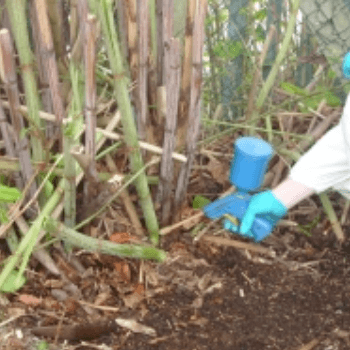
INNSA Standard
STEM INJECTION OF JAPANESE KNOTWEED
Stem injection of Japanese knotweed is established and cost-effective means of Japanese knotweed treatment which can be used in most weather conditions and can minimise damage to other plants
- All operatives carrying out stem injection works must hold (or be directly supervised by someone holding) a valid certificate of competence (e.g. NPTC PA1*), as well as the relevant award relating to the equipment being used (e.g. NPTC PA6INJ*).
- INNSA Contractor Members offering invasive weed treatment should provide additional continued training to all site operatives. This training should provide specific information and techniques regarding all non-native invasive species which the site operatives will be required to treat.
- Where chemical application works are carried out in or near to water, a relevant award (e.g. PA6INJ or PA6W8) must be held by a supervising member of the site team.
- Operations being carried out near water should apply for and comply with Environment Agency (or the relevant local agency) water quality management requirements.
- Herbicide mixing and application works should always be carried out using appropriate PPE specific to the task in hand.
- Chemical application works should be carried out with a relevant policy in place to minimise the risks of cross-contamination, protect the environment and minimise any risk to water.
- Companies should be forthcoming with customers about the risks and limitations of herbicide treatments.
- Contractors should always provide a written method statement, risk-assessment and COSHH assessment for all herbicide application works that are undertaken.
- Contractors should follow all statutory instructions, including the recommended dosage rates as specified on the herbicide manufacturers’ guideline (the product label).
- Contractors should ensure that equipment is correctly calibrated prior to work commencing and maintained throughout the procedures.
- A management plan should be in place to ensure all works have been completed successfully.
- Surveying of the plants must be completed by the contractor prior to starting the contract to establish the potential success of the stem injection in the first season.
- Previously treated Japanese knotweed, damaged or cut canes or small growth may take more than one season to treat and / or may need alternative remediation methods. All customers should be informed of this.
- Companies should at all times maintain an awareness of current pesticide regulations and laws appropriate to their area(s) of operation and ensure all employees and sub-contractors are regularly updated, preferably through CPD accreditation.
- Ground disturbance or excavation work within the contaminated areas and buffer zones will need the contractor’s consent prior to works commencing and may require additional remediation.
*further details available at: https://www.nptc.org.uk/qualificationdefault.aspx
